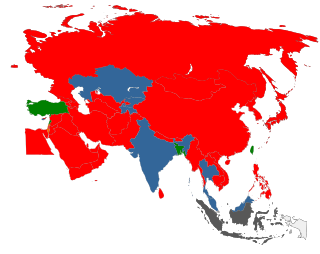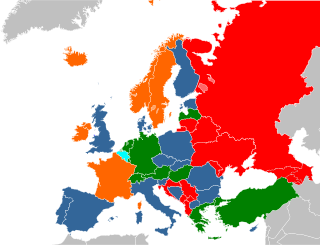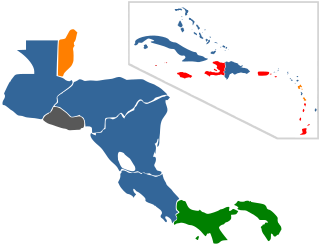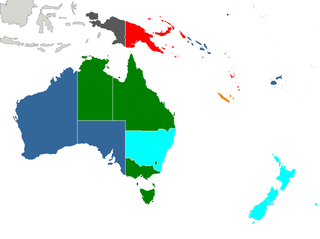Related Research Articles

In Great Britain, the act of engaging in sex as part of an exchange of various sexual services for money is legal, but a number of related activities, including soliciting in a public place, kerb crawling, owning or managing a brothel, pimping and pandering, are illegal. In Northern Ireland, which previously had similar laws, paying for sex became illegal from 1 June 2015.
Forced prostitution, also known as involuntary prostitution or compulsory prostitution, is prostitution or sexual slavery that takes place as a result of coercion by a third party. The terms "forced prostitution" or "enforced prostitution" appear in international and humanitarian conventions, such as the Rome Statute of the International Criminal Court, but have been inconsistently applied. "Forced prostitution" refers to conditions of control over a person who is coerced by another to engage in sexual activity.
Prostitution in South Africa is illegal for both buying and selling sex, as well as related activities such as brothel keeping and pimping. However, it remains widespread. Law enforcement is poor.
Prostitution in Ecuador is legal and regulated, as long as the prostitute is over the age of 18, registered, and works from a licensed brothel. Prostitution is widespread throughout the country. Many brothels and prostitutes operate outside the regulatory system and the regulations have been less strictly enforced in recent years. 25,000 prostitutes were registered in the year 2000. In 2007 it was estimated that 70% of the prostitutes in the country were from Colombia. The country attracts Colombian prostitutes as the currency is the US$ rather than the unstable Colombian peso. UNAIDS estimate there to be 35,000 prostitutes in the country.
Prostitution in Bolivia is legal and regulated. It is only permitted by registered prostitutes in licensed brothels. Prostitutes must register and must undergo regular health checks for sexually transmitted diseases. The police are allowed to check whether the prostitutes are registered or not, and have attended a clinic during the previous 20 days.
Prostitution in Uruguay was legislated in 2002 through the sex work law (17.515). Before that, prostitution was unlegislated but it was not illegal, since the constitution allows any activity that is not forbidden by law. Prostitution is currently not a subject of debate.
Prostitution in Belize is legal, but the buying of sexual services is not. Associated activities such as operating a brothel, loitering for the purposes of prostitution and soliciting sex are also illegal.
Prostitution in Argentina is legal under Federal law. Article 19 of the constitution states: "The private actions of people that do not offend in any way the public order and morality, nor damage a third person, are only reserved to God, and are exempt from the authority of the magistrates." Organised prostitution is illegal. In addition, individual provinces may place further restriction on the trade. For example, in San Juan, publicly offering sex services for money is punishable by up to 20 days in jail. In 2012, newspapers were banned from carrying classified-ads offering sexual services. UNAIDS estimated there to be about 75,000 prostitutes in the country in 2016.

Prostitution in Pakistan is a taboo culture of sex-trade that exists as an open secret but illegal. Prostitution is largely based in organisational setups like brothels or furthered by individual call girls.
Prostitution in Kazakhstan is itself legal, but acts facilitating prostitution, such as operating a brothel or prostitution ring, are illegal. Forced prostitution and prostitution connected to organised crime are prohibited. Prostitution is a serious problem. NGOs reported that criminal prostitution rings often included local law enforcement officials.

Prostitution is legal and regulated in Bangladesh. Prostitutes must register and state an affidavit stating that they are entering prostitution of their own free choice and that they are unable to find any other work. Bangladeshi prostitutes often suffer poor social conditions and are frequently socially degraded.
Prostitution is not illegal in Sri Lanka, however, related activities such as soliciting, procuring, and brothels are outlawed. It is also illegal to traffic persons for prostitution, especially minors. Prostitution is not as widespread in Sri Lanka as in some neighbouring countries. It is estimated that there are 40,000 prostitutes in the country, and nearly half of them operate in Colombo.

The legality of prostitution in Europe varies by country.
Prostitution in Suriname is illegal but widespread and the laws are rarely enforced. Human trafficking and Child prostitution are problems in the country. Prostitutes are known locally as "motyo". UNAIDS estimate there to be 2,228 prostitutes in the country.
Indonesia is a source, transit, and destination country for women, children, and men trafficked for the purposes of commercial sexual exploitation and forced labor. The greatest threat of trafficking facing Indonesian men and women is that posed by conditions of forced labor and debt bondage in more developed Asian countries and the Middle East.

Prostitution laws varies widely from country to country, and between jurisdictions within a country. At one extreme, prostitution or sex work is legal in some places and regarded as a profession, while at the other extreme, it is considered a severe crime punishable by death in some other places. A variety of different legal models exist around the world, including total bans, bans that only target the customer, and laws permitting prostitution but prohibiting organized groups, an example being brothels.
Prostitution in Namibia is legal and a highly prevalent common practice. Related activities such as solicitation, procuring and being involved in the running of a brothel are illegal. A World Bank study estimated there were about 11,000 prostitutes in Namibia.
Human trafficking in the Ivory Coast refers to the practice of forced labour and commercial sexual exploitation which uses Côte d'Ivoire a source, transit, and destination country for women and children who are trafficked for these purposes. Trafficking within the country's borders is more prevalent, with victims primarily trafficked from the north of the country to the more economically prosperous south. Boys from Ghana, Mali, and Burkina Faso are subjected to forced labour in the agricultural sector, including on cocoa, coffee, pineapple, and rubber plantations; boys from Ghana are forced to labour in the mining sector; boys from Togo are forced to work in construction; and boys from Benin are forced to work in carpentry and construction. Girls recruited from Ghana, Togo, and Benin to work as domestic servants and street vendors often are subjected to conditions of forced labour. Women and girls are also recruited from Ghana and Nigeria to work as waitresses in restaurants and bars and are subsequently subjected to forced prostitution. Trafficked children often face harsh treatment and extreme working conditions.

Legality of prostitution in the Americas varies by country. Most countries only legalized prostitution, with the act of exchanging money for sexual services legal. The level of enforcement varies by country. One country, the United States, is unique as legality of prostitution is not the responsibility of the federal government, but rather state, territorial, and federal district's responsibility.

Prostitution in Oceania varies greatly across the region. In American Samoa, for instance, prostitution is illegal, whereas in New Zealand most aspects of the trade are decriminalised.
References
- ↑ "100 Countries and Their Prostitution Policies". Procon. Retrieved 5 December 2017.
- 1 2 3 "Sex Work Law". Sexuality, Poverty and Law Programme. Retrieved 4 December 2017.
- 1 2 3 4 5 6 7 Report on Human Rights Practices 2006: Chile. United States Bureau of Democracy, Human Rights, and Labor (6 March 2007). This article incorporates text from this source, which is in the public domain.
- ↑ Cotton, John (9 November 2008). "Quasi-Legalized Prostitution in Chile". Escape America Now. Retrieved 5 December 2017.
- ↑ Código Sanitario. Archived 24 September 2015 at the Wayback Machine Artículo 41. Para las personas que se dedican al comercio sexual, se llevará una estadística sanitaria, no permitiéndose su agrupación en prostíbulos cerrados o casas de tolerancia.
- ↑ "Reglamento sobre infecciones de transmisión sexual y las normas de manejo y tratamiento" [Regulation on sexually transmitted infections and the rules of management and treatment"] (in Spanish). Ministry of Health (Chile) . Retrieved 4 December 2017.
- 1 2 Trafficking in Persons Report 2009 Country Narratives – Countries A Through C. State.gov. Retrieved on 30 March 2011.
- ↑ 2008 Human Rights Report: Chile. State.gov (25 February 2009). Retrieved on 2011-03-30.
- ↑ "Chile 2018 Trafficking in Persons Report". U.S. Department of State. Archived from the original on 26 July 2018. Retrieved 26 July 2018.
 This article incorporates text from this source, which is in the public domain .
This article incorporates text from this source, which is in the public domain . - ↑ Bureau of International Labor Affairs (ILAB) – U.S. Department of Labor Archived 2 October 2013 at the Wayback Machine . Dol.gov. Retrieved on 30 March 2011.
- ↑ "Chilean Police Chief Booted Amid Prostitution Scandal". Latin American Herald Tribune. 27 June 2009. Retrieved 5 December 2017.